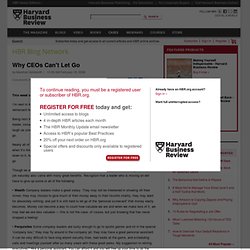

Why CEOs Can't Let Go - Marshall Goldsmith. By Marshall Goldsmith | 10:36 AM February 18, 2009 This week’s question for Ask the Coach: I’m next in line for the big job, and my boss, the CEO, is acting very odd.

She’s talked about retirement for years, but now she’s waffling. Why? What can I do? Being next in line for the big job, you may understand in a few years what makes it so hard for any leader, including the CEO, to move on. Nearly all of the leaders I have talked to over the years have assured me that they will be different when it’s time to move — that they will have no problem letting go of their jobs.
Though as a CEO or leader, one may have faced an incredible amount of stress and pressure, the job naturally also came with many great benefits. . • Wealth Company leaders make a great salary. . • Perquisites Some company leaders are lucky enough to go to sports games and sit in the special “company box;” they may fly around in the company jet; they may have a great personal assistant. The Brainstorming Process Is B.S. But Can We Rework It? The business practice of brainstorming has been around with us so long that it seems like unadorned common sense: If you want a rash of new ideas, you get a group of people in a room, have them shout things out, and make sure not to criticize, because that sort of self-censoring is sure to kill the flow of new thoughts.

It wasn’t always so: This entire process was invented by Alex Osborn, one of the founders of BBDO, in the 1940's. It was motivated by Osborn’s own theory of creativity. He thought, quite reasonably, that creativity was both brittle and fickle: In the presence of criticism, it simply couldn’t wring itself free from our own minds. We could only call our muses if judgments didn’t drag us down. Osborn claimed that this very brainstorming process was the secret to BBDO’s durable creativity, allowing his ad guys to produce as many as 87 ideas in 90 minutes--a veritable avalanche. You’re More Creative Working Alone Lehrer doesn’t quite explain why that happens. Why is that? Do Innovation Consultants Kill Innovation?
Are companies more innovative than ever before?

Judging from the vast number of Fortune 500 companies professing their commitment to innovation, the answer is yes. But we sense that the more a company talks, thinks, and strategizes about innovation, the less real, big innovation it produces. Take the electronics maker Philips, which introduced one of the world’s first electronic razors, the compact cassette, the CD, and many other game-changing inventions. In more recent years, Philips has been a fixture at innovation and design conferences, presenting impressive strategies, road maps, and processes. The company commands impressive sales--its market cap is about $15 billion--but most people would be hard-pressed to think of a recent exciting breakthrough from the Dutch company. We are not alone in our belief that innovation in one respect has plateaued. The creation of the innovation consultant marks a sea change.
The problem with the innovation professionals is twofold.